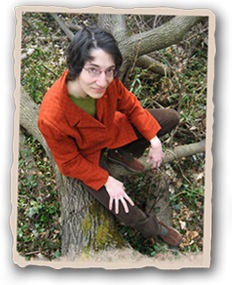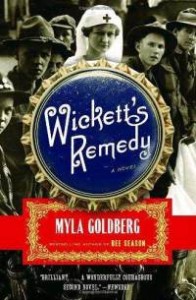When I found out last November that Myla Goldberg was going to be a visiting professor at Adelphi University’s MFA program, the first thing I did was buy her new book, The False Friend. It was actually my first digital book, my first purchase on my Kindle. After a semester under the writer’s guidance, I had the opportunity to sit down with Goldberg – author of three novels, the critically acclaimed Bee Season (2000), Wickett’s Remedy (2006) and most recently The False Friend – and get to know her own process and path to writing.
The False Friend offers insight into the formation of early memories and how childhood events can shape the people we become. Goldberg captures the essence of those youthful friendships from the very start of her novel. Listen to how she introduces Djuna Pearson, the protagonist Celia’s best friend:
Djuna Pearson had appeared at the desk in front of Celia on the first day of fifth grade, the new girl’s dark ponytail tied back with ribbon, stray hairs feathering a slender nape like enameled porcelain. Djuna had excellent posture, and for this Celia decided to hate her. By the second week of school they were friends with an intensity that summoned hangers-on.
Goldberg’s witty writing draws the reader into the novel. There’s an intimacy that leaves us always wanting more, never quite able to step away from the story unfolding on the page because of its familiarity.
In the following interview, Goldberg offers insight into her life as a writer, teaching in an MFA program, and the inspiration behind The False Friend.
Interview:
Casey Tolfree: What made you want to write?
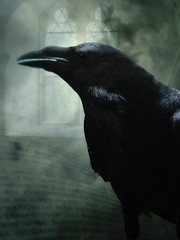 Myla Goldberg: Writing is all I’ve ever wanted to do since I was six or so, it’s what I told people I wanted to do, and it’s what I was doing. I remember sitting at my grandparents’ kitchen table writing a story about Edgar Allan Poe in crayon that I was illustrating. Other things got in the way. For a while I wanted to be an archeologist, I wanted to a dinosaur person, then I wanted to be a figure skater, but writer was always in there. The older I got, I was like: “Yeah, writer, I don’t know what else.” I’m really glad it worked out because I’m not sure what would have happened if it didn’t.
Myla Goldberg: Writing is all I’ve ever wanted to do since I was six or so, it’s what I told people I wanted to do, and it’s what I was doing. I remember sitting at my grandparents’ kitchen table writing a story about Edgar Allan Poe in crayon that I was illustrating. Other things got in the way. For a while I wanted to be an archeologist, I wanted to a dinosaur person, then I wanted to be a figure skater, but writer was always in there. The older I got, I was like: “Yeah, writer, I don’t know what else.” I’m really glad it worked out because I’m not sure what would have happened if it didn’t.
Was there ever a point when you turned away from writing?
I have always been extremely single-minded. Every writer is going to have a different story. There are plenty of people who come to writing later in life, or think maybe they want to do it, then change their minds, but it was always unambiguous for me. For a while I thought, if the writing thing doesn’t work out, maybe while I write I can deliver the mail. But it was always something in the service of letting me be a writer instead of another career that was attractive to me.
Growing up, what were some of your favorite books?
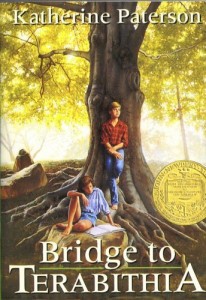 Dr. Seuss and Roald Dahl starting early. Judy Blume was a biggie. I got into horror really early; I read a bunch of Stephen King. He’s really good at narrative and I’m very glad I learned narrative building blocks by reading [his books]. What else? Bridge to Terabithia – I adored that book. The Cay was another one I read over and over again.
Dr. Seuss and Roald Dahl starting early. Judy Blume was a biggie. I got into horror really early; I read a bunch of Stephen King. He’s really good at narrative and I’m very glad I learned narrative building blocks by reading [his books]. What else? Bridge to Terabithia – I adored that book. The Cay was another one I read over and over again.
I read a lot of absolute trash; I loved the V.C. Andrews books, Flowers in the Attic. Jean Ahl – Clan of the Cave Bear. I was into all the series. I was really indiscriminate and voracious about what I read when I was little. Though Watership Down I read early on, probably earlier than I should have, and really dug it. I remember reading Les Miserables on a family road trip when I had just finished eighth grade – I loved its mix of high and the low. In high school, J.D. Salinger. Milan Kundera was a big deal when I first read his work because he was the first writer I read who combined philosophy and fiction. He made me realize what you can get away with and all the different things you can use fiction to talk about. That was really exciting to discover. Kurt Vonnegut had a huge impact on me in high school. I liked his wacky ideas. David Foster Wallace was a very big deal. Jeanette Winterson.
How did your reading influence your development as a writer?
The books definitely influenced my writing. Every writer should have this happen, or is already influenced to one extent or another. I can’t even read Donald Barthelme anymore because I read him and then I write like him. He possesses me. I haven’t read him in 15 or 20 years because of this. Actually, David Foster Wallace also does that to me a bit. If there is a voice or a zone that I particularly dig, without even meaning to I find myself copying it. That can be frustrating to a young writer because you think, “This isn’t even me, this is someone else.” But it’s natural to be influenced by other writers and to have the writing sound like someone else. It happens along the way to becoming yourself as a writer. It’s still the case. I’ll still read people and realize that I am now writing under their influence. It doesn’t bother me. You can use it in a sort of prescriptive way. While writing The False Friend, I read a lot of Graham Greene and Ian McEwan because I really liked what they did in their books and I wanted it to seep in. I will actually read writers with the idea that I want them to influence me if I’m working on something.
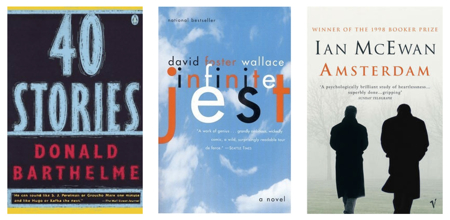
Did you have mentors or teachers who encouraged you along the way?
No one said, “No, don’t do it.” But I didn’t have an experience like Jonathan Safran Foer. He’d been planning on medical school when a famous writer read his work and said, “Oh, my God. You have a gift,” and wrote to his parents to say “Your child must be a writer.” It’s nothing dramatic. I went to Oberlin College and I was an English major and I took some creative writing classes there, but I didn’t major in it. One teacher there who was wonderful gave me some good advice. I told her I was interested in being a writer and she said, “Well don’t go into publishing.” And I said, “Okay.” I was and still am anti-authoritarian, which gets in the way of a student-teacher relationship, so I missed out on that. I wish I had been less knee-jerk anti-authority when I was going through school, because I probably could have met some very cool people.
If you always knew you wanted to be a writer, why not major in writing?
I didn’t see the point. I wanted to read books. If I wanted to be a writer I figured I needed to be reading and that’s what I interested me. Writing was something I was already doing and already liking, so while I did take some classes, majoring in [writing] didn’t make sense to me.
How did your time in Prague influence your craft?
I went to Prague right after graduating from college. I lived there for a year, and it was the first time I wasn’t a student anymore. It was the first time I was A WRITER. So it was in Prague that I started to figure out what that actually means. I really started a writing discipline of sitting down every day and having a set number of hours that I was going to write no matter what. And it was also in Prague that I formed a sort of ad hoc workshop, as there were a bunch of expats there who were literary types. Outside of college, that was my first workshop environment. I basically think of Prague as my graduate school experience. I had my own workshops and I was writing daily.
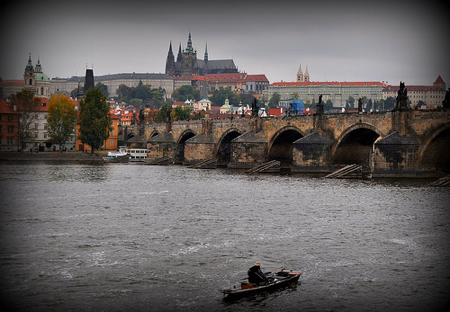
Not having attended an MFA program, what has it been like teaching in one?
At first I felt weird about it. I wondered, “Am I even allowed do to this? Is this okay?” But I am enjoying it, and my students seem to be enjoying it and seem to be getting something out of the class. I think that there are things that I can teach people that are helpful. My philosophy towards running a workshop is not that I’m teaching writing so much as I’m teaching critical faculties. There is only so much writing you can actually teach. You can foster it in people, but so much of writing is through the practice of writing. What can be taught is how to edit and critique your own work and the work of others. So I really focus on that aspect, and train students to focus their critical eyes and get perspective on their own work, and to really appreciate what a revision involves, because so much of writing is revision. By taking that philosophy to teaching a workshop, I feel much better about it, because one thing that bothers me about the larger culture of MFA programs – certain schools foster this lie – is that a defined path exists that makes you a writer. That you can take your classes and get your degree and congratulations, you’re a writer. It’s just not true. As with any art – I don’t care if it’s writing prose, poetry, painting, or sculpture – you can take some classes, but they won’t turn you into a writer. I wanted to think about an MFA program in a way that didn’t perpetuate that idea. That was my biggest concern as a teacher.
How do you balance teaching with your own writing?
 It depends on the semester. Usually I can do a pretty good job because I’ll only teach one or two classes, which gives me three, or even four, writing days a week. So on a day I’m not teaching, I am writing. On that day it’s a 9-5 job for me. I sit down at my computer at 9 or 10 in the morning and write until I have to pick up the kids, or, if it’s a day my husband is picking up the kids, until it’s dinnertime. So a writing day for me will be anywhere from 5 to 8 hours of writing. Those are my favorite days. There are some semesters where I teach more, and then I have less time for it, but when I do get to do it that’s what I do.
It depends on the semester. Usually I can do a pretty good job because I’ll only teach one or two classes, which gives me three, or even four, writing days a week. So on a day I’m not teaching, I am writing. On that day it’s a 9-5 job for me. I sit down at my computer at 9 or 10 in the morning and write until I have to pick up the kids, or, if it’s a day my husband is picking up the kids, until it’s dinnertime. So a writing day for me will be anywhere from 5 to 8 hours of writing. Those are my favorite days. There are some semesters where I teach more, and then I have less time for it, but when I do get to do it that’s what I do.
Not really. For me the fun of the writing is finding out what’s going to happen. I usually have my beginning, and often a sense of what the end is going to be, and sometimes a sense of some things that might happen in the middle, so those are my guiding points as I work my way through a story. But I don’t know how I am going to get there per se. Often those things will change in the course of the writing. That’s what makes it fun, but it’s also what makes it take so long. There are some writers who know going in that they will write chapter two on this day and three on this day. I can’t imagine doing it that way, but that means that my past two books have taken me five years to write.
Where do you think you write best?
In my office at home. I am in a little room, and I get to close the door. It’s too small to be a bedroom for anyone other then an infant, which is why I don’t feel bad taking up the space. I have friends who write in cafes, but I need a sense of privacy – that no one is watching me. Part of the reason is I just want quiet. I am very, very sensitive to noise. But I will also act things out. I have talked in class about how writing and acting are allied art forms. For example, I will make facial expressions that my characters are making to see how it feels and how I can describe it. I make gestures, and that’s what a crazy person does, so if I were doing that in a café I would be really self-conscious. Being in a room with the door closed is kind of key.
You are also in a band called The Walking Hellos. I was wondering if your creative process in music overlaps with your fiction writing.
 Sometimes they feed each other. Writing is extremely solitary. It is the most solitary creative life you can imagine. The music I make is the opposite because there is no lead person who comes in with all the songs written. It’s a very collaborative process and I love that dynamic. The way they are opposites makes me feel like a fully realized creative person. In fact, The False Friend started as lyrics to a song. I was writing a song and realized there was more to it. That’s never happened before and I don’t know if it will happen again, but it was totally cool.
Sometimes they feed each other. Writing is extremely solitary. It is the most solitary creative life you can imagine. The music I make is the opposite because there is no lead person who comes in with all the songs written. It’s a very collaborative process and I love that dynamic. The way they are opposites makes me feel like a fully realized creative person. In fact, The False Friend started as lyrics to a song. I was writing a song and realized there was more to it. That’s never happened before and I don’t know if it will happen again, but it was totally cool.
All three of your novels are in the third person. Is that a preference or did the stories simply require it?
Well, here’s the funny thing: they all started in first. I’ll start in first because that is how I get to know a character best, because I am inside her head. It’s the most comfortable way to get to know a new world and new people. Then, after I’ve been there for a while, I feel restrained by first person. The nice thing about first person is it’s very dynamic and exciting, but the difficulty is that it’s very limiting: you can only see through one set of eyes. Once I have a stronger sense of the story that I want to tell, I want to be able to say more than just one character can say, so I inevitably switch to third. That said, I have a new idea that might keep me in first person – and it might be fun to write in a different voice.
How do you go back and rewrite everything in third person? Do you rewrite from scratch, or line-edit the existing text?
You can’t just go change the “I”s to “he” and “she.” Revision – for me – means basically starting over. I get to a point with revision where, yes, I’m just changing some words or adding small things. But in the early days of a book, revision means I figure something out and I start over with a blank page. When I’m switching from first to third it’s a combination of those elements. In some places I can just switch the “I” to a “he” or” she,” but different voices allow you to do different things. Your text has to change to reflect that you are now using a voice with different powers and different properties.
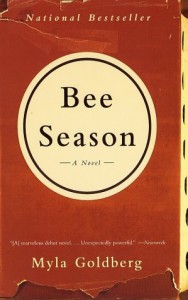 Your first book, Bee Season, was made into a movie. What was your experience of watching your novel turn into a film? Were you involved in the process?
Your first book, Bee Season, was made into a movie. What was your experience of watching your novel turn into a film? Were you involved in the process?
I was not at all involved, other than thanks for this nice check and good luck to you. It was weird though; at first I was like, “Should I even let them do this? Is it selling out?” I had a couple older, wiser writer friends who advised me, “Take the money. It will let you be a writer for longer.” And I realized that they were absolutely right. The best case scenario: people go to the movie and say, “What a good movie. I want to read the book.” Worst case scenario: people go to the movie and think, “Man, the book was so much better.” Either way sounded pretty good to me.
Did the success of Bee Season affect work on your second novel?
It affected everything. I went from having to have a day job and having to write on the side to being able to be a full-time writer. It was amazing and it gave me the freedom to just write what I wanted to write for a while. In terms of how it affected me artistically, that’s something I’m still figuring out. It’s weird; I was not expecting to be a successful writer. I was expecting to be a struggling writer and now I’m getting back to that. I’m getting that chance to be the thing I always thought I would be. It messes with you, because you ask yourself, “Wait, why did everyone like this, and does that mean I need to do that again? Am I supposed to do that again, or can I just write what I want to write?” But what I try to do when I’m writing is forget about all that and follow my imagination wherever it wants to take me.
What song originally sparked the idea for The False Friend?
There is a particular song called “The Unloved.” It’s a little bit different; it’s about a bunch of girls who throw another girl down a well and then she disappears, so that was the beginning of that story idea.
Did you start writing the protagonist of The False Friend, Celia, as a child or as an adult?
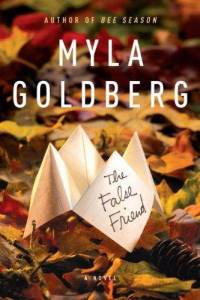 I started with Celia as an adult. In my second book, Wickett’s Remedy, I started with my main character as a child, and then after I’d written 50 or 75 pages, I realized that the story began when she was an adult. That was a drag, but also good, because I needed to know those things about her. But with Celia, one of the first things that I had was the beginning. She is walking down the street, sees a car, and has a memory come back to her. That was always very firmly in my mind as the beginning of the book. Usually I write a linear story in chronological order. False Friend was bizarre in that there were two chapters that occurred much later in the story that I wrote really early on, because they were already fully formed in my head. I didn’t know at what point in the book they were going to come, and they started getting further and further back in the book until I realized, “Oh, these happen at the end.”
I started with Celia as an adult. In my second book, Wickett’s Remedy, I started with my main character as a child, and then after I’d written 50 or 75 pages, I realized that the story began when she was an adult. That was a drag, but also good, because I needed to know those things about her. But with Celia, one of the first things that I had was the beginning. She is walking down the street, sees a car, and has a memory come back to her. That was always very firmly in my mind as the beginning of the book. Usually I write a linear story in chronological order. False Friend was bizarre in that there were two chapters that occurred much later in the story that I wrote really early on, because they were already fully formed in my head. I didn’t know at what point in the book they were going to come, and they started getting further and further back in the book until I realized, “Oh, these happen at the end.”
I really wondered about the ending. How did you determine what to explain and what to leave hanging in the balance?
To my mind, the most important questions in this book get answered. The reader finds out what actually happened. The only ambiguous thing to my mind is Celia’s future, but, personally, I am optimistic. I like having hanging chads in stories because life is like that. I was comfortable leaving the question of Celia’s future unanswered.
Can you talk a bit about guilt and innocence in the book?
Well, Celia does a horrible thing; it just isn’t the horrible thing she feels guilt over. She was a bully, and a pretty terrible one. It’s a discomforting knowledge that she has to push that aside. Her guilt stems from the fact that when you’re a kid, everything feels like your fault. For me this book was all about exploring memory and how weird memory is and the way we turn our memories on their heads and reshape them.
Jensenville felt important to the novel. Have you actually been up there on Route 17 or spent time there?
Jensenville is made up, but it’s stolen from a combination of Binghamton, New York, and Johnson City, New York, and Endicott, this little area in upstate New York that I am very familiar with because my in-laws live up there. I’ve been visiting Endicott for the past ten years and I’m fascinated by it. I like the area because it really is this place of fallen empire. I love that it clearly used to have glorious days and now those days are so behind it – that contrast between what it was and what it is now is really fascinating.
Do you have any advice for emerging writers?
Yeah! Write and read constantly. Aspiring writers who are not reading everything they can get their hands on aren’t going to make it, simple as that. The only way to learn is to read all the time, and also write. If you can’t make a daily practice of writing, you need a regular practice of writing. If you are specifically interested in writing a novel, then you need a daily practice where you get as huge a chunk of writing done as you can. But you can’t just sit down and start by writing 5-8 hours a day. That’s like telling someone who’s never run to go run a marathon. Writing is a muscle; you have to build up your endurance. At first, you write for half an hour every day, and then maybe you can do an hour Monday-Friday, but then on weekends you write for two hours. That’s the way to build it up. Try to cut out as much regular time for your writing as you can. Be stubborn. Be prepared to be rejected. Be prepared to not let that stop you and just keep coming. And find readers who are comfortable being honest with you, and whose honesty you are comfortable hearing. You need people who are smart and honest, but also kind, and constructive with their criticism, not just, “Eh, this didn’t work. I thought this was boring.” That’s useless. That’s just going to make you feel like crap. You need someone who can say, “At this part I don’t really understand this character,” and “I thought this part was moving slowly.” The constructive stuff is what’s really important.
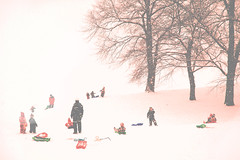 What are you working on right now?
What are you working on right now?
Mostly working on a children’s book, a really early chapter book. I have a very, very embryonic novel idea that is so embryonic I can’t even articulate it yet. The children’s book is about a brother and a sister who are playing in the snow when something very strange happens.
Teaching, writing, music, children – how do you find the time?
It’s a little bit insane. Well, my oldest child is in second grade, and my youngest is in preschool and next year will be going to public school. When they are in school I write. That’s easy enough. The band only practices once a week, at night after the kids are in bed. I don’t work on weekends. Weekends are for family; we all hang out with each other. So that’s how, but I am extremely disciplined. I structure my time very deliberately and carefully and then I stick to those structures. I think that’s another good piece of advice for aspiring writers. You need to have that sort of discipline for yourself and be structured with your time.

